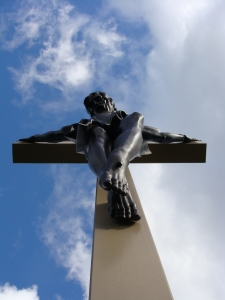 My most recent Catholic theme seems to revolve around suffering. The idea keeps emerging in the books I’m reading, on Catholic radio, in homilies and more … and wow is it a revelation! Catholics hold to the idea of “redemptive suffering,” which turns the traditional understanding of suffering on its head, making it a positive, wonderful thing (bear with me :), I’ll explain in a minute).
My most recent Catholic theme seems to revolve around suffering. The idea keeps emerging in the books I’m reading, on Catholic radio, in homilies and more … and wow is it a revelation! Catholics hold to the idea of “redemptive suffering,” which turns the traditional understanding of suffering on its head, making it a positive, wonderful thing (bear with me :), I’ll explain in a minute).
While I’m not undergoing any true suffering myself (thanks be to God), it’s certainly a topic I’ve always grappled with and I think many nonbelievers do, as well. How could a loving, merciful God allow suffering?
Let’s start by saying we can’t know exactly. Afterall, we cannot know the mind of God, at least not until we reach our glory. That said, there are some clues to the meaning of suffering that we can follow. Let’s start with the greatest suffering of all time: Christ on the Cross.
Christ suffered unbearably, through torture, humiliation, mocking, and what must have been pain beyond belief. Yet, did you notice the greatest good of all time that it produced? Salvation for all who accept it! What can we learn from this? Suffering = Good.
Crazy, I know.
Here’s another clue. If you study the life of the saints, so many of them underwent great personal suffering, especially bodily suffering. Why would God punish them so? Perhaps because it’s not a punishment, but a gift — a wonderful thing.
I am reading a book right now that is the diary of a woman named Elisabeth Leseur who lived in the early 1900’s in France. She is up for sainthood but no progress has been made as of yet. Elisabeth, who was subject to much suffering — both mental and physical — looked upon this suffering as a way to “work” for God. She was married to an atheist, whom she loved dearly and whom she deeply desired to convert, but instead he argued and dissuaded her in her religion, causing her much personal grief.
She says repeatedly in her diary that words and actions do little for her hopes and desires for those souls around her, but rather suffering, prayer and mortifications (fasting, enduring discomfort, etc.) do the greatest work. So instead of complaining or arguing with her husband, she kept her sufferings inside and offered them up to God for the work of converting her husband. Can you imagine the power of using that same principle for problems in your own life?
This reminds me so much of my dear confirmation saint, St Therese of Lisieux, who gave glory to God and worked to help souls — those of unbelievers, those in purgatory, her loved ones — in her “little way” of doing small acts of sacrifice for God. She too says that prayers, combined with fasting and almsgiving/charity are the quickest way to make your prayers heard.
Elisabeth desired to do much more with her life, but instead was confined to bed for various illnesses throughout her life. She determined that God’s true vocation for her was to “work” through suffering, which she was able to do so well by offering her sacrifices and all works for the intentions of others, so often for those in purgatory.
I recently was watching Super Saints on EWTN with Bob and Penny Lord in an episode about St. Philip Neri. It was said that he too offered many masses and prayers for the souls in purgatory, and when he arrived in heaven, they all greeted him, sharing that they had been praying for him since getting to heaven in gratitude for his kind prayers for them. What a wonderful thought!
If you’ve hung on with me this long, let this be some validation of suffering as the greatest “work” for God. Upon Elisabeth’s death, her long atheist husband converted to Catholicism, and not only that, he became a priest and was the one responsible for publishing her diary that it might help others. I find that to be a true miracle, but one that I have no doubt God granted for Elisabeth’s tireless work.
Let me end with this paragraph from Elizabeth’s diary, so eloquently put, moreso than I can:
“Union with Jesus Christ, which we shall realize in Heaven in joy and vision, is already possible for us on earth in suffering. That is why all souls in love with Jesus, those souls that have heard the mysterious and irresistible call of Christ, love suffering and, far from rejecting it with an entirely human horror, ask for it, desire it as the sweet forerunner of the Master, as that which ushers us into His presence. It is suffering that reveals the Cross to us, that opens the divine Heart to us, that enables us to enter into this supernatural world that no human thing can reach, which we will know only in eternity, but from which a glimmer shines over us through the grace of suffering and the radiance of the Cross.” — My Spirit Rejoices by Elisabeth Leseur, Sophia Institute Press, 1996.






